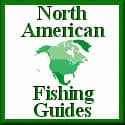Bass on Hook is Supported by our readers. As an Amazon Associate We earn commissions from qualifying purchases. For more informtion read our Amazon Affiliate Disclosure and Affiliate Disclosure Policies.
"Finding Your Way Home"
By Tom Lester Ⅱ
I can remember the first time I took my boat out on an unfamiliar body of water for a fishing trip.
Although I had studied a map of the lake I was going to be fishing, I found it a bit intimidating to find my way around once I was on the water.
The creeks and landmarks that appeared so visible on the map, where not nearly defined and easy to find when puttin' around on the water.
I'm sure that this happens to almost everyone that goes boating at some time or another.
I recently talked with one of my local fishing buddies that went fishing with another friend of mine at a nearby lake.
After a morning of fishing that produced a couple of fish for each fisherman, they were ready to start home before the heat became totally unbearable.
There was just one problem, they couldn't find their way back to the boat ramp.
They searched and drove around for quite some time before finally finding the cove that contained the boat ramp they had used to launch their boat.
After burning up more gas finding the ramp than they used to find fish (according to the friend that wasn't driving), they trailered the boat and returned home.
This story, funny as it was, brought to mind a couple of points I wanted to share.
Important Steps to Finding Your Way Home
It is always important to familiarize yourself with landmarks when going out on the water, especially if you are not familiar with the lake.
A boat house, a large rock at the mouth of a creek, a peculiar looking tree or whatever you can use to mentally mark your location is always a good idea.
With the technology of a GPS (global positioning system), it is a good idea to mark a waypoint at the ramp before heading out on the water.
I know I've used mine to help me find the exact location of the boat ramp after a long day of fishing on a new lake.
These units have become more affordable and user friendly over the past couple of years.
In the event you do become lost, the first thing to do is to stay calm and not panic.
Most lakes will have some place you can stop and ask for directions, such as a marina or another boat dock.
You can also ease up to someone else on the water and ask for directions to the boat ramp you are looking for.
Most people are more than willing to help you out.
Finally, it is always a good idea to carry a portable cell phone with you in the boat.
This can be a lifesaver in the event of an emergency.
I have known more than one individual that has used their cell phone to call for help after witnessing an accident on the water or being involved in one them self.
Finding Your Way Home Summary
Last March, my Ranger boat dealer, Gary Wendeborn of Gary's Marine in Gatesville, TX came upon a boat wreck in the middle of Lake Amistad.
They had a phone and were able to summon an ambulance and other authorities to be waiting at the boat ramp when they brought in a badly injured fisherman.
The fact that the ambulance was at the ramp waiting for them when they got the man out of the water, in their boat and to the ramp, probably saved his life.
Don't leave that phone in the truck!
Take it with you and turn it off if you don't want to be disturbed.
If you need or want it, you can always turn it on.
As for my buddies, they got home safely.
Fortunately they had enough drinks and cigars to help pass the time until they found their way back to the ramp.
By following some simple advice and using common sense you should be able to ensure your safety when out boating.
After all there is someone waiting for you on shore so be smart and safe!
Until next time, enjoy the great outdoors.
Tom Lester
Look for other articles written by Tom Lester in Tom's Pro Staff Angler Profile










